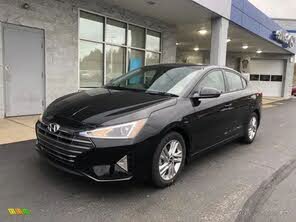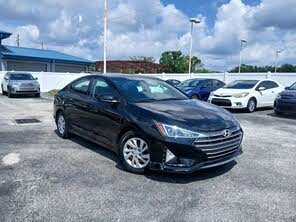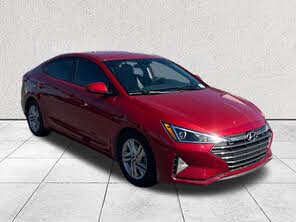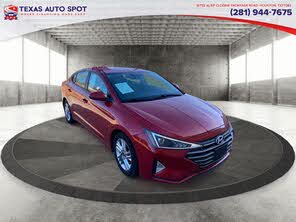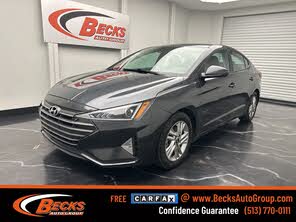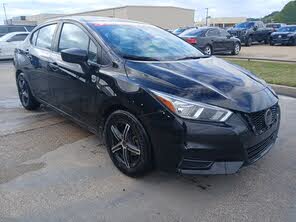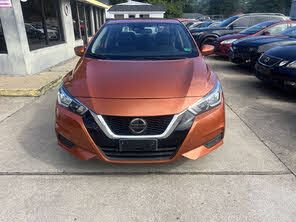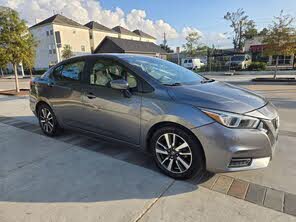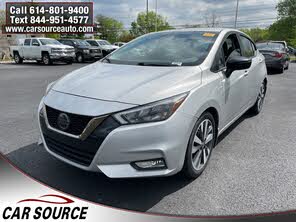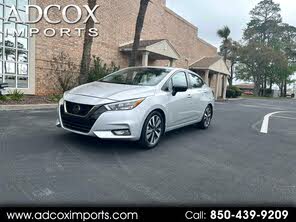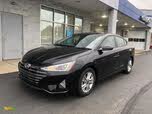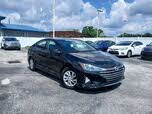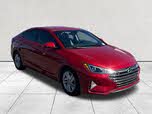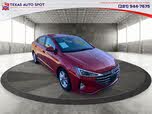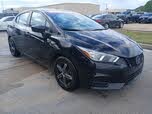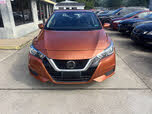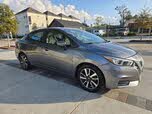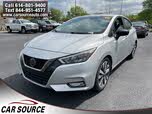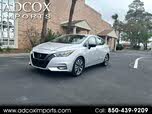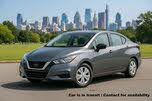2020 Hyundai Elantra vs 2020 Nissan Versa
Overview | |
MSRP$14,830 | MSRP$19,300 |
Listings303 | Listings1052 |
Ratings & Reviews | |
User Reviews | User Reviews |
Expert reviews7.2 out of 10 | Expert reviews8.3 out of 10 |
Pros
Cons
| Pros
Cons
|
2020 Nissan Versa Reviews SummaryWhen you're on a tight budget and need to replace a car, you often face a tough choice: Do you buy a new small car or something that’s pre-owned but has more space? For many years, if you were in the market for a new car, few came as cheaply as the Nissan Versa. Not only was it marketed as the least-expensive car in the United States, but it also had a plucky, underdog appeal to it. However, the charm of the Versa started to wear off as its shortcomings became more apparent. If you look at the “cheap��” end of the market, you'll find some pretty unlovable cars, like the Mitsubishi Mirage and Chevrolet Spark. But there are also some bright spots. The Kia Rio and Hyundai Accent are both competent cars in their own ways, and the Honda Fit has always been a serious player. With the Fit, you never felt like you were seriously compromising to meet your budget. It seems as though Nissan has caught on to the realization that racing to the bottom works for only so long. Buyers have certainly caught on to the notion that you can have a small car that’s actually kind of good (See: Fit). In response, Nissan has rolled out the all-new 2020 Versa. It’s no longer the cheapest car in America, and in fact, it costs a couple of thousand dollars more than last year's version. But does that mean it’s more car, too? Read on to find out. | |
2020 Hyundai Elantra Reviews SummaryHyundai isn’t pulling any punches when it comes to the compact car segment, where value is of utmost importance. And though a completely redesigned 2021 Elantra is coming soon, the automaker bestows several value-enhancing improvements upon the outgoing 2020 Hyundai Elantra compact sedan. They include free scheduled maintenance, improved fuel economy ratings, and new standard safety features. | |
No video found | |
Popular Features & Specs | |
Engine1.6L 122 hp I4 | Engine2.0L 147 hp I4 |
Drive TrainFWD | Drive TrainFWD |
Seating Capacity5 | Seating Capacity5 |
Horsepower122 hp @ 6300 rpm | Horsepower147 hp @ 6200 rpm |
MPG City27 | MPG City31 |
MPG Highway35 | MPG Highway41 |
Engine | |
Engine Name1.6L 122 hp I4 | Engine Name2.0L 147 hp I4 |
Torque114 lb-ft @ 4000 rpm | Torque132 lb-ft @ 4500 rpm |
Horsepower122 hp @ 6300 rpm | Horsepower147 hp @ 6200 rpm |
DrivetrainFWD | DrivetrainFWD |
Fuel Economy | |
MPG City27 | MPG City31 |
MPG Highway35 | MPG Highway41 |
Interior | |
Seating Capacity5 | Seating Capacity5 |
Safety | |
Front Crash Overall5 | Front Crash Overall4 |
Side Crash Overall5 | Side Crash Overall4 |
Dimensions & Capacity | |
Cargo Space14.7 cu ft | Cargo Space14.4 cu ft |
Curb Weight2650 lbs | Curb Weight2844 lbs |
Height57.3 in | Height56.5 in |
Length177.0 in | Length181.9 in |
Width68.5 in | Width70.9 in |
Wheelbase103.1 in | Wheelbase106.3 in |
Maximum Payload955 lbs | Maximum Payload1080 lbs |
Number of doors4 | Number of doors4 |
Overview | ||
MSRP | $14,830 | $19,300 |
Listings | ||
Ratings & Reviews | ||
User reviews | ||
Expert reviews | 7.2 out of 10Read full review | 8.3 out of 10Read full review |
Pros & cons | Pros
Cons
| Pros
Cons
|
Summary | When you're on a tight budget and need to replace a car, you often face a tough choice: Do you buy a new small car or something that’s pre-owned but has more space? For many years, if you were in the market for a new car, few came as cheaply as the Nissan Versa. Not only was it marketed as the least-expensive car in the United States, but it also had a plucky, underdog appeal to it. However, the charm of the Versa started to wear off as its shortcomings became more apparent. If you look at the “cheap” end of the market, you'll find some pretty unlovable cars, like the Mitsubishi Mirage and Chevrolet Spark. But there are also some bright spots. The Kia Rio and Hyundai Accent are both competent cars in their own ways, and the Honda Fit has always been a serious player. With the Fit, you never felt like you were seriously compromising to meet your budget. It seems as though Nissan has caught on to the realization that racing to the bottom works for only so long. Buyers have certainly caught on to the notion that you can have a small car that’s actually kind of good (See: Fit). In response, Nissan has rolled out the all-new 2020 Versa. It’s no longer the cheapest car in America, and in fact, it costs a couple of thousand dollars more than last year's version. But does that mean it’s more car, too? Read on to find out. | Hyundai isn’t pulling any punches when it comes to the compact car segment, where value is of utmost importance. And though a completely redesigned 2021 Elantra is coming soon, the automaker bestows several value-enhancing improvements upon the outgoing 2020 Hyundai Elantra compact sedan. They include free scheduled maintenance, improved fuel economy ratings, and new standard safety features. |
Video | No video found | |
Popular Features & Specs | ||
Engine | 1.6L 122 hp I4 | 2.0L 147 hp I4 |
Drive Train | FWD | FWD |
Seating Capacity | 5 | 5 |
Horsepower | 122 hp @ 6300 rpm | 147 hp @ 6200 rpm |
MPG City | 27 | 31 |
MPG Highway | 35 | 41 |
Engine | ||
Engine Name | 1.6L 122 hp I4 | 2.0L 147 hp I4 |
Torque | 114 lb-ft @ 4000 rpm | 132 lb-ft @ 4500 rpm |
Horsepower | 122 hp @ 6300 rpm | 147 hp @ 6200 rpm |
Drivetrain | FWD | FWD |
Fuel Economy | ||
MPG City | 27 | 31 |
MPG Highway | 35 | 41 |
Interior | ||
Seating Capacity | 5 | 5 |
Safety | ||
Front Crash Overall | 5 | 4 |
Side Crash Overall | 5 | 4 |
Dimensions & Capacity | ||
Cargo Space | 14.7 cu ft | 14.4 cu ft |
Curb Weight | 2650 lbs | 2844 lbs |
Height | 57.3 in | 56.5 in |
Length | 177.0 in | 181.9 in |
Width | 68.5 in | 70.9 in |
Wheelbase | 103.1 in | 106.3 in |
Maximum Payload | 955 lbs | 1080 lbs |
Number of doors | 4 | 4 |
The 2020 Nissan Versa marked a significant departure from its predecessor's "big car" styling, which featured oversized headlights and other exaggerated design elements. The new model adopted a more refined and handsome look, drawing inspiration from its larger siblings, the Maxima and Altima. This change resulted in a more cohesive and attractive design without borrowing oversized components. Inside, the Versa's cabin closely resembled that of the Nissan Kicks, thanks to the shared V platform. While the platform didn't offer the versatility seen in the Kicks, it provided ample interior space for a subcompact sedan. The cabin featured a straightforward yet stylish design, with a two-tone theme and unique seat patterns that added a touch of flair.
In contrast, the 2020 Hyundai Elantra retained its bold restyle from 2019, which introduced a geometric-influenced appearance. This design set the stage for the dramatically angular styling of the upcoming 2021 model. The Elantra's angular headlight, fog light, and wheel designs were accentuated by a black paint job, creating a stylish small car with strong visual contrast. Inside, the Elantra's interior received an upscale update, featuring silver trim on various elements and a more refined look. However, some hard and glossy plastics remained, reminding occupants that it was still a mainstream compact car.




The 2020 Nissan Versa featured a revised 1.6-liter 4-cylinder engine, producing 122 horsepower and 114 pound-feet of torque, an improvement over the previous generation's 109 horsepower and 107 pound-feet of torque. This engine powered the front wheels through either a 5-speed manual or a continuously variable automatic transmission (CVT). The S trim came standard with the manual transmission, while the CVT was available on the S and standard on the SV and SR trims. The Versa's acceleration improved, making it more capable of merging onto highways and navigating city traffic. The CVT managed power well, and a Sport mode added liveliness to the driving experience. Fuel economy with the manual transmission was 27 mpg city, 35 highway, and 30 combined, while the CVT achieved 32/40/35. In real-world driving, the Versa averaged 34.7 mpg.
The 2020 Hyundai Elantra offered a base 2.0-liter four-cylinder engine with 147 horsepower, paired with a new continuously variable transmission (CVT). This CVT replaced the previous six-speed automatic, contributing to a $1,100 price increase for the SE trim. The Elantra Eco featured a turbocharged 1.4-liter engine with 128 horsepower and 156 lb-ft of torque, paired with a seven-speed dual-clutch automatic transmission (DCT). The Elantra Sport boasted a 1.6-liter turbo four-cylinder engine with 201 horsepower and 195 lb-ft of torque, along with an independent rear suspension for improved handling. The Elantra's CVT, called the "Intelligent Variable Transmission," provided smooth and efficient performance, though real-world fuel economy fell short of expectations, averaging 29.3 mpg. The Elantra's ride and handling were affected by its torsion beam axle rear suspension, which detracted from both ride comfort and handling precision.
The 2020 Nissan Versa retained its predecessor's 15-cubic-foot trunk, one of the largest in its class, with a large opening for easy loading. However, the new Versa lost 6 inches of rear legroom, making the backseat less accommodating for adult passengers. While the front seats offered ample legroom, the reduced rear space was noticeable for carpooling or ridesharing. Despite this drawback, the Versa remained a practical choice for personal commuting.
The 2020 Hyundai Elantra offered comfortable accommodations for four adults, with a fifth person squeezed in for short trips. The Limited trim featured power driver's seat adjustment, leather upholstery, and a sliding center console armrest for added comfort. Notably, every Elantra included a front passenger's seat-height adjuster. The Elantra also came with a dual-zone automatic climate control system, though rear passengers lacked air conditioning vents. Interior storage was well-proportioned for a compact car, and the trunk provided 14.4 cubic feet of space, nearly matching some midsize sedans. A thoughtful touch was the interior grab handle inside the trunk lid, making it easy to close.
The 2020 Nissan Versa stepped up its game in the cabin with a standard 7-inch touchscreen, Bluetooth connectivity, Siri Eyes Free, and a hands-free text-messaging assistant. It also featured three USB ports, one up front and two in the center console for rear passengers. The mid-level SV trim, recommended by CarGurus, included the upgraded NissanConnect system with Apple CarPlay and Android Auto. The SV trim also featured an upgraded instrument panel with a digital screen, offering various functions such as safety alerts, Bluetooth streaming audio, and fuel-economy stats. This system provided much of the functionality of more advanced systems without requiring a full instrument panel replacement.
The 2020 Hyundai Elantra came standard with a touchscreen infotainment system, Bluetooth, and a USB port. The base SE trim had a 5-inch screen, while the SEL trim and above featured a 7-inch display with Apple CarPlay, Android Auto, and SiriusXM satellite radio. The Value Edition included a complimentary subscription to Blue Link Connected Car and Remote plans for the first three years. The Limited trim added wireless smartphone charging and a premium Infinity sound system. The Ultimate Package for the Limited trim increased the touchscreen size to 8 inches and added navigation, Blue Link Guidance service, and SiriusXM data services. The Sport trim offered similar upgrades, packaged differently. The infotainment system was user-friendly, with a high-mounted touchscreen, shortcut buttons, and volume and tuning knobs. The Infinity sound system impressed with its depth of sound.
The 2020 Nissan Versa added a host of standard driver-assistance features, including automatic emergency braking, pedestrian detection, lane-departure warning, and automatic high beams. These features were part of a broader trend of automakers incorporating advanced safety systems into all trims. While this democratization of safety features was commendable, it also led to higher repair costs for minor accidents due to the sensors embedded in bumpers. Other standard safety features included a reversing camera, a full array of front- and side-impact airbags, and Nissan's Easy Fill Tire Alert, which honked the horn when the tire was properly inflated.
The 2020 Hyundai Elantra made Hyundai Smart Sense standard on all trim levels. This suite of advanced driving assistance systems included forward-collision warning, automatic emergency braking, lane departure warning, lane-keeping assist, and a driver attention monitor. Starting with the SEL trim, the Elantra added blind-spot warning and rear cross-traffic alert. The Limited and Sport trims featured full LED headlights with automatic high-beam operation. The Ultimate Package for the Limited trim included adaptive cruise control, a pedestrian detection system, and Safe Exit Assist. The Elantra earned a Top Safety Pick from the Insurance Institute for Highway Safety (IIHS) when equipped with full LED headlights and received a four-star overall rating from the National Highway Traffic Safety Administration (NHTSA), though there was a concern about rear-door intrusion during side-impact tests.
CarGurus highlights

According to CarGurus experts, the overall rating for the 2020 Nissan Versa is 7.2 out of 10, while the 2020 Hyundai Elantra scores 8.3 out of 10. Based on these ratings, the 2020 Hyundai Elantra is the better choice, offering a more powerful engine, a roomier and more comfortable interior, and a higher level of safety features.
Choose the 2020 Hyundai Elantra if:
- You want a more powerful engine and a sportier driving experience.
- You need a roomier interior with more comfort features for passengers.
- You value advanced safety features and higher safety ratings.
Choose the 2020 Nissan Versa if:
- You prioritize a lower starting price and better fuel economy with the CVT.
- You need a large trunk for a subcompact sedan.
- You appreciate a straightforward yet stylish interior with modern tech features.
CarGurus highlights

According to CarGurus experts, the overall rating for the 2020 Nissan Versa is 7.2 out of 10, while the 2020 Hyundai Elantra scores 8.3 out of 10. Based on these ratings, the 2020 Hyundai Elantra is the better choice, offering a more powerful engine, a roomier and more comfortable interior, and a higher level of safety features.
Choose the 2020 Hyundai Elantra if:
Shop Now- You want a more powerful engine and a sportier driving experience.
- You need a roomier interior with more comfort features for passengers.
- You value advanced safety features and higher safety ratings.
Choose the 2020 Nissan Versa if:
Shop Now- You prioritize a lower starting price and better fuel economy with the CVT.
- You need a large trunk for a subcompact sedan.
- You appreciate a straightforward yet stylish interior with modern tech features.

By: CarGurus + AI
At CarGurus, our team of experienced automotive writers remain at the heart of our content operation, conducting hands-on car tests and writing insightful guides that are backed by years of industry experience. To complement this, we are harnessing AI to make our content offering more diverse and more helpful to shoppers than ever. To achieve this, our AI systems are based exclusively on CarGurus content, ratings and data, so that what we produce is both unique to CarGurus, and uniquely helpful to car shoppers.

